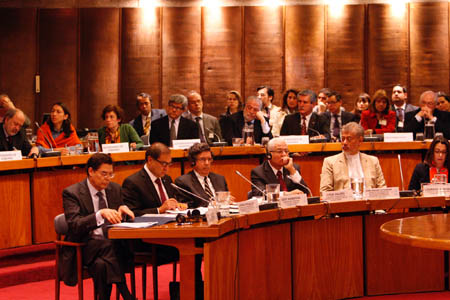Strengthening the Role of the UN in Global Governance
Topic(s)
Those present at the meeting, which was organized by ECLAC and the Chilean Ministry of Foreign Affairs, discussed improving the coordination between the United Nations and forums such as the G-20.

(8 August 2011) "The United Nations (UN) must make changes in order to respond to a world which is no longer organized into countries, but rather is structured on global networks", stated ECLAC Executive Secretary, Alicia Bárcena today at the opening of the regional seminar on "The United Nations in global governance", which ends on Tuesday.
During the meeting, organized by the Economic Commission for Latin America and the Caribbean (ECLAC) and the Chilean Ministry of Foreign Affairs, Ms. Bárcena called, in particular, to strengthen the United Nations Economic and Social Council (ECOSOC), making it a forum which can bring together all of the Bretton Woods institutions, such as the World Bank, the International Monetary Fund and the World Trade Organization.
The high representative also stressed the importance of "strengthening regional integration processes to achieve better political and economic convergence", and "redefining the State-market-society equation through inclusive social pacts".
During the opening of the seminar, Alfredo Moreno, Foreign Affairs Minister of Chile, stated that within the framework of the current economic crisis "we have seen collective and multilateral answers, but they have been from actors such as the G-20, which brings together great economic powers including emerging economies".
He added that "it is important to examine the different complementarities between the various actors driving the world economy, since it involves global actors, as well as regional or sectorial actors and groups. In this respect, the relationship between the G-20 and the United Nations is worth analysing".
Mr. Moreno also stated the importance of "regional and subregional space in world governance, particularly in the face of the world economic order".
In the same way, the President of the sixty-fifth session of the United Nations General Assembly, Joseph Deiss, expressed that "the global governance landscape is becoming more fragmented and more complex. Traditional multilateral institutions, like the UN and the Bretton Woods institutions are increasingly criticized for not being efficient and representative enough".
"There is a risk for the UN to be marginalized", declared the high official. However, he did state that he was convinced that both the organization in its entirety and the General Assembly have a central role to play to capture the complexity of this new world and to shape a global governance structure that is efficient, open and representative.
In Deiss's opinion, a decisive effort is required to revitalize the General Assembly of the United Nations, to reform the Security Council of this organization and review the work of the Human Rights Council. He also suggested strengthening the economic bodies of the United Nations, in particular of ECOSOC, and "to find the appropriate mechanisms for communication, consultation, and cooperation between the UN and the other actors of global governance".
Ms. Bárcena indicated that "the G-20 must act within the principle of subsidiarity. This means focusing on what can be done better and its involvement in changes to the international financial system, which the crisis highlighted as necessary, and not including in its agenda other areas already covered by the multilateral institutionality established. The G-20 must work to resolve and correct financial issues in cooperation with other multilateral organizations".
The seminar is being attended by Under-Secretary of Foreign Affairs and Representative of the Mexican Government in the G-20, Lourdes Aranda, the Assistant Secretary General for Economic Development in the Department of Economic and Social Affairs (DESA), Jomo Kwame Sundaram, and the Deputy Director for Global Economic Affairs and Development Strategy, French Ministry of Foreign and European Affairs, Cyrille Pierre.
The former Executive Secretaries of ECLAC, José Antonio Ocampo and Gert Rosenthal, who is the current Permanent Representative of Guatemala to the UN, are also attending.
Other delegates include the Vice-Minister and Permanent Representative of the Bolivarian Republic of Venezuela to the UN, Jorge Valero, Permanent Representative of Argentina to the UN and President of the Group of 77 plus China, Jorge Argüello, Deputy General Director for Multilateral and Global Affairs of the Chilean Foreign Affairs Ministry, Adolfo Carafí, Special Advisor to the Foreign Policy Unit of the Office of the President of Brazil, Guilherme de Aguiar Patriota, and Deputy General Manager of the Central Bank of Ecuador, Verónica Legarda, as well as other senior officials.
See also:
Any queries should be addressed to the ECLAC Public Information and Web Services Section.
E-mail: dpisantiago@cepal.org; Telephone: (56 2) 210 2040.